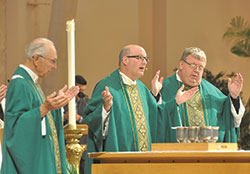Msgr. William F. Stumpf
is elected archdiocesan
administrator by
college of consultors

Msgr. William F. Stumpf, center, prays the eucharistic prayer during the Oct. 4, 2015, archdiocesan Respect Life Mass at SS. Peter and Paul Cathedral in Indianapolis. On Jan. 9, he was elected archdiocesan administrator by the priests who make up the archdiocesan college of consultors, and will lead the Church in central and southern Indiana until a new archbishop is appointed. Joining Msgr. Stumpf at the altar are Father Paul Landwerlen, left, and Father Robert Robeson. (File photo by Natalie Hoefer)
By Sean Gallagher
In accordance with the stipulations of the Church’s Code of Canon Law, Msgr. William F. Stumpf was elected archdiocesan administrator on Jan. 9 at the Archbishop Edward T. O’Meara Catholic Center in Indianapolis.
He was elected by the seven archdiocesan priests who serve on the archdiocesan college of consultors.
As archdiocesan administrator, Msgr. Stumpf will oversee the day-to-day business of the Archdiocese of Indianapolis until Pope Francis appoints a new shepherd for the Church in central and southern Indiana.
“It’s an honor and a privilege,” said Msgr. Stumpf of the election. ‘I take it very seriously. I love the archdiocese, and so it is always a privilege to serve when you love the Church.”
After he was elected and accepted the election, Msgr. Stumpf made a profession of faith while placing his right hand on a Bible.
“It was very powerful for me,” he said. “Those are all the things that I hold dear. They mean everything to me. But it was even more powerful to me in a sense of leadership. Not only are these the things that I’ve held dear and supported all my life as a priest, now I’m being asked to preserve those for a larger entity than just a parish.”
In leading the archdiocese through this time of transition, Msgr. Stumpf’s authority will be limited by canon law. He is prohibited, for example, from closing parishes or opening new ones.
He also cannot name pastors of parishes until the archdiocese has been without an archbishop for one year. Msgr. Stumpf is, however, able to name priests as parish administrators in the interim.
Msgr. Stumpf will also need the approval of the college of consultors to call a man to be ordained a priest or deacon.
“The administrator is not to be making innovations,” said Msgr. Stumpf, who served as archdiocesan vicar general under Cardinal Tobin. “This is not a time of change. He’s just to maintain the archdiocese, to see us through this time of transition until the new archbishop comes.”
Msgr. Stumpf said that the fact that Pope Francis did not name an administrator for the archdiocese at the time that he appointed Cardinal Tobin to lead the Archdiocese of Newark, N.J., represented a “vote of confidence” by the Vatican about the Church in central and southern Indiana.
“If there were concerns that the archdiocese was divided or had serious issues or struggles, I think Rome would have stepped in and named an apostolic administrator,” said Msgr. Stumpf. “That’s happened in other dioceses.”
He also noted that Cardinal Tobin—after he was appointed to lead the Newark Archdiocese, but before he was installed there—began a “pastoral assessment” of the Archdiocese of Indianapolis that “gives the new archbishop a real report of who is the Archdiocese of Indianapolis, what are the key concerns and strengths of the archdiocese that he’s going to be the shepherd of.”
This assessment, facilitated by a private consulting group, will involve discussions with clergy and lay leaders across the archdiocese, and is expected to be concluded by June.
Msgr. Stumpf encouraged all the faithful across central and southern Indiana to pray during this time of transition until a new archbishop is appointed.
“We should be wanting to pray that God sends us a wonderful new shepherd and for us, that we prepare our hearts to welcome that new shepherd,” he said. “It’s going to be very important to make him feel a part of the archdiocese.” †
